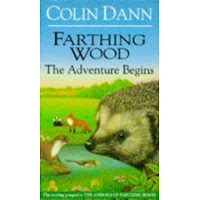 I finished reading a second book for the ‘Eco Reading Challenge’ last week, Colin Dann’s ‘Farthing Wood: The Adventure Begins’. This book is a prequel to the ‘Farthing Wood’ series, which follows a group of animals, who put aside their natural enmity and band together to find a new home when Farthing Wood is redeveloped by humans. In the prequel we see the chain of events that ultimately allows property developers to build on Farthing Wood.
I finished reading a second book for the ‘Eco Reading Challenge’ last week, Colin Dann’s ‘Farthing Wood: The Adventure Begins’. This book is a prequel to the ‘Farthing Wood’ series, which follows a group of animals, who put aside their natural enmity and band together to find a new home when Farthing Wood is redeveloped by humans. In the prequel we see the chain of events that ultimately allows property developers to build on Farthing Wood. The Farthing Wood otters are a nuisance, they don’t take life as seriously as the other animals think they should and they’re always boasting about how their presence keeps the wood safe from humans. When the fish from the river become scarce the otters start hunting in the woods, eventually attempting to snatch prey right from the jaws of other animals. The hunting animals decide they’ve had enough and begin a campaign to drive the otters from the wood, scaring them and poisoning them by rounding up sick shrews for the otters to hunt. The otters take flight, hoping to find a new, safe home, but unlike the animals that will later set out from Farthing Wood the otters all meet unfortunate fates. Slowly the animals left in the wood begin to realise that without the otters, the woods have lost their special status with the humans and soon their homes will be destroyed.
For all the otter’s antics human intervention is what causes the main disruption within the woods. The otters begin to hunt in the woods because they cannot find fish, and while it’s never obviously stated in the book I assumed that this was due to human overfishing or pollution. Humans may not force the otters from the woods, but as soon as the otters leave the rest of the wildlife becomes irrelevant and the wood is up for development. Even the humans who try to help the otters return to the woods end up causing their deaths, by frightening them into more dangerous situations.
By the end of the book the grisly animals deaths are mounting and the ending is quite distressing, even though anyone who has read the ‘Farthing Wood’ series knows the animal’s salvation has arrived when a baby fox is born. Colin Dann was writing in the ‘Watership Down’ tradition, where the brutal realities of nature were portrayed freely. I think it’s important that children know about the less pretty side of nature, so they can appreciate the vital struggles that create a balanced ecosystem. Hopefully an understanding of the daily fight for survival will engender a feeling of deeper connection with wildlife and a greater desire to protect it, as children come to see the varied levels of interest that the animal kingdom has to offer. Dann’s creation of animals that exhibit motivations we associate closely with humans, like jealously and pride, may also help readers to feel connected to animals, even if some argue that anthropomorphising animals creates another set of unhelpful issues.
So, to sum up this novel has a cracking plot and provides a useful commentary on human intervention in nature but is not the best book Dann ever produced. I’d suggest starting at the beginning of the series and saving the prequel for later. If you’re in the mood for some ‘Farthing Wood’ adventures but don’t have the books why not check out the first episode of the BBC cartoon series.
Tags: